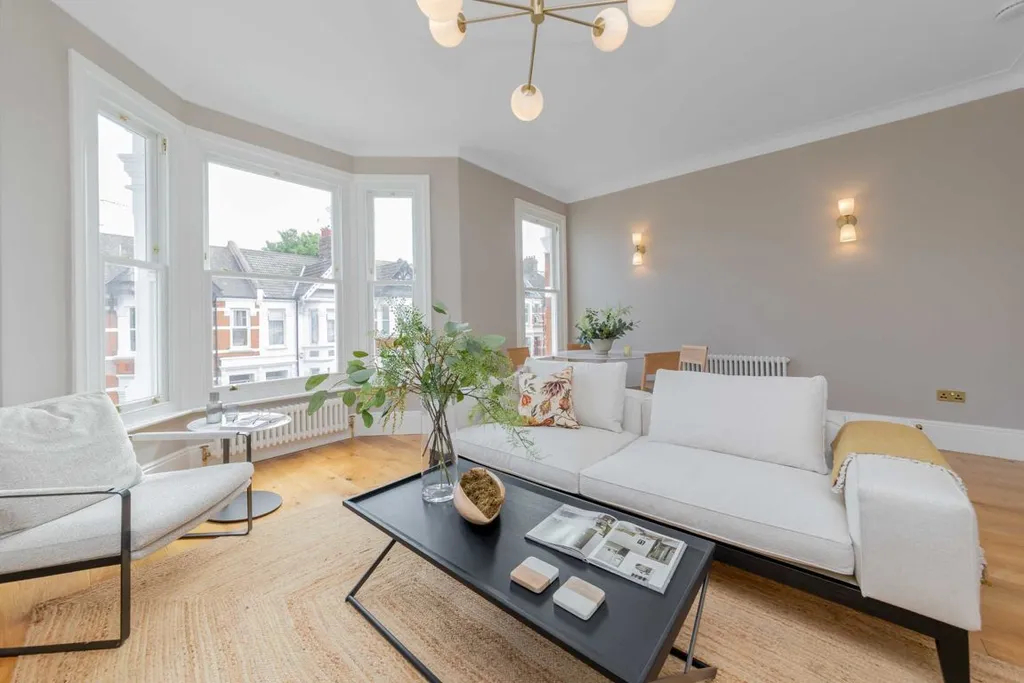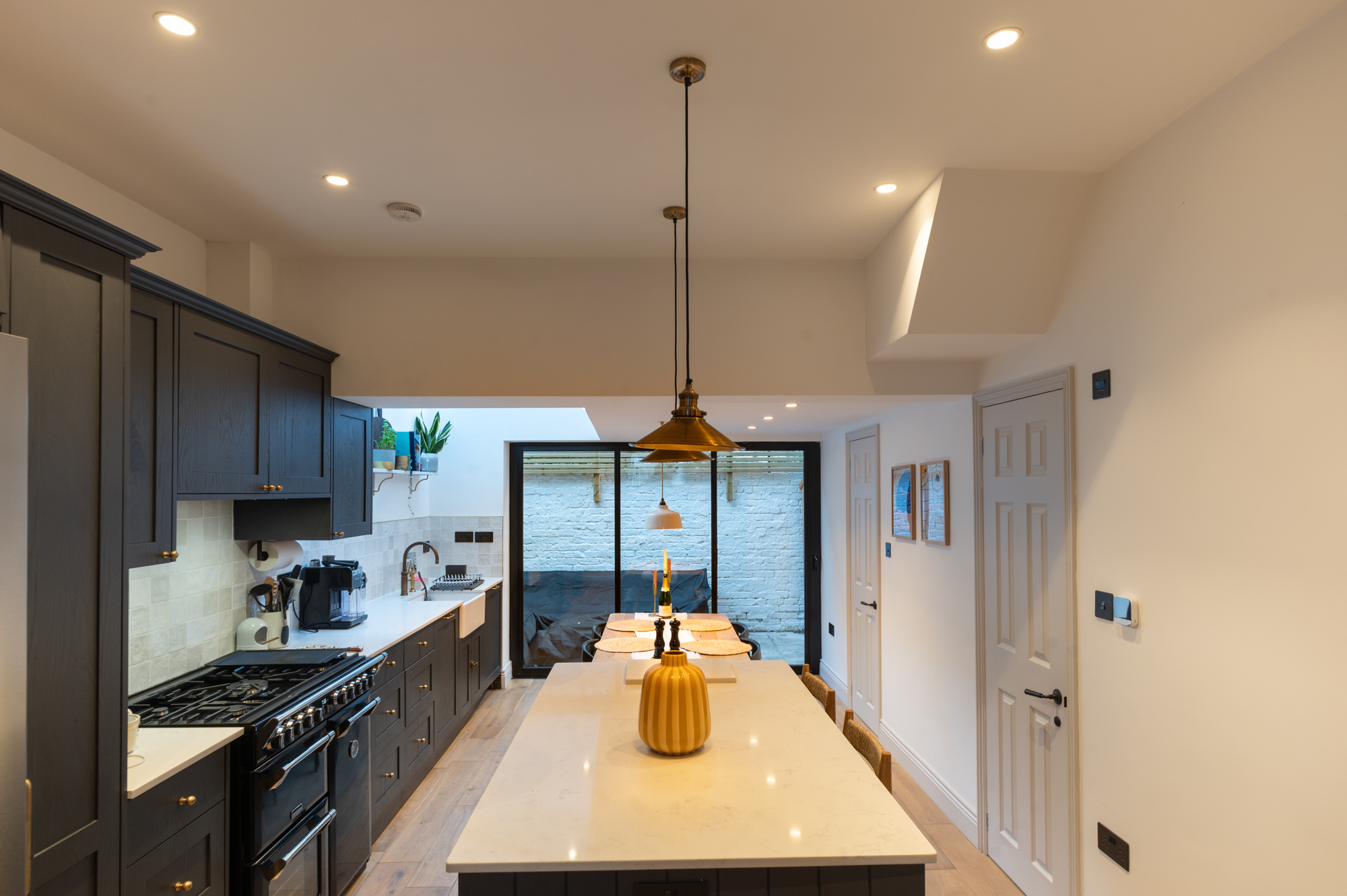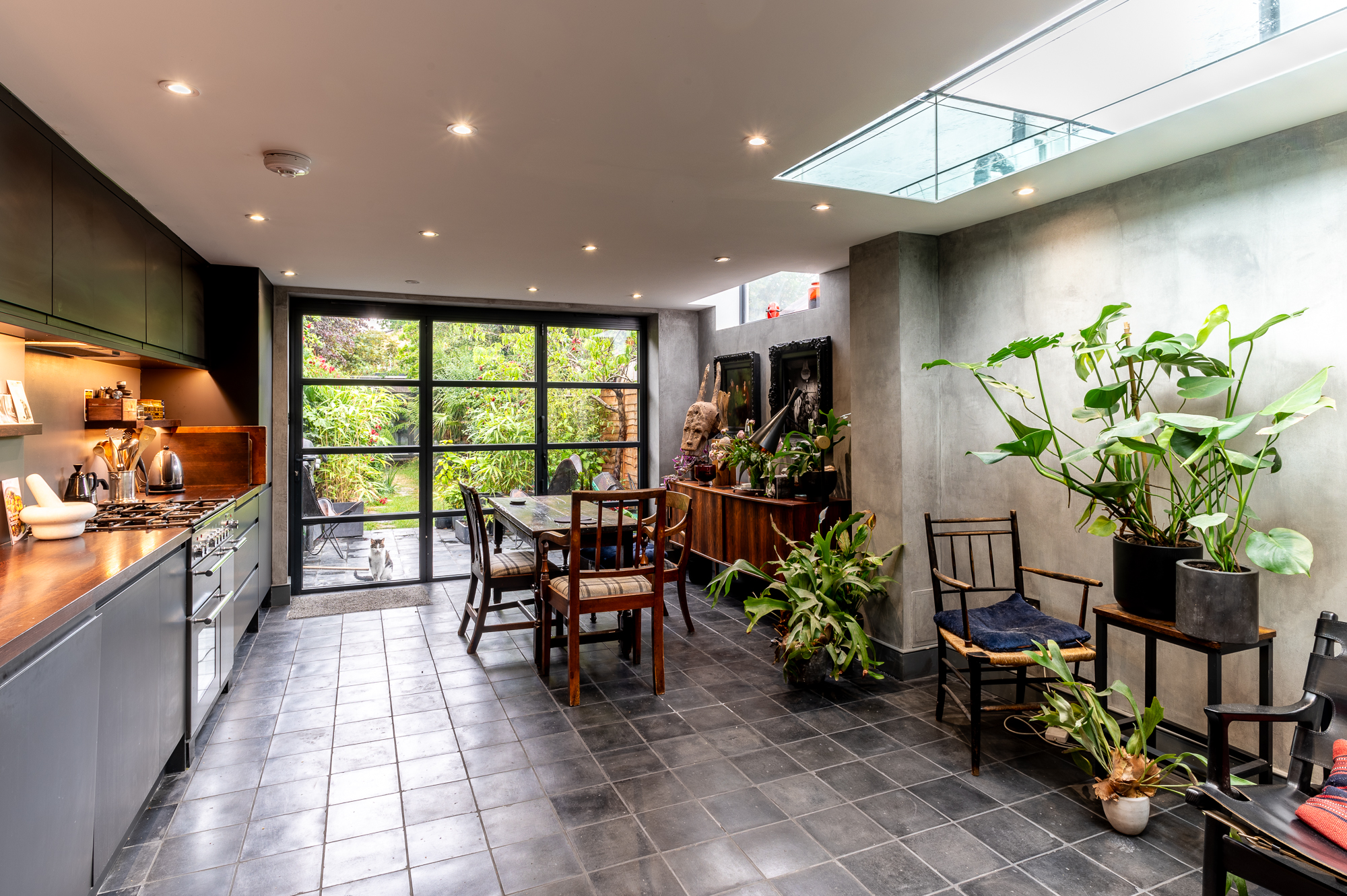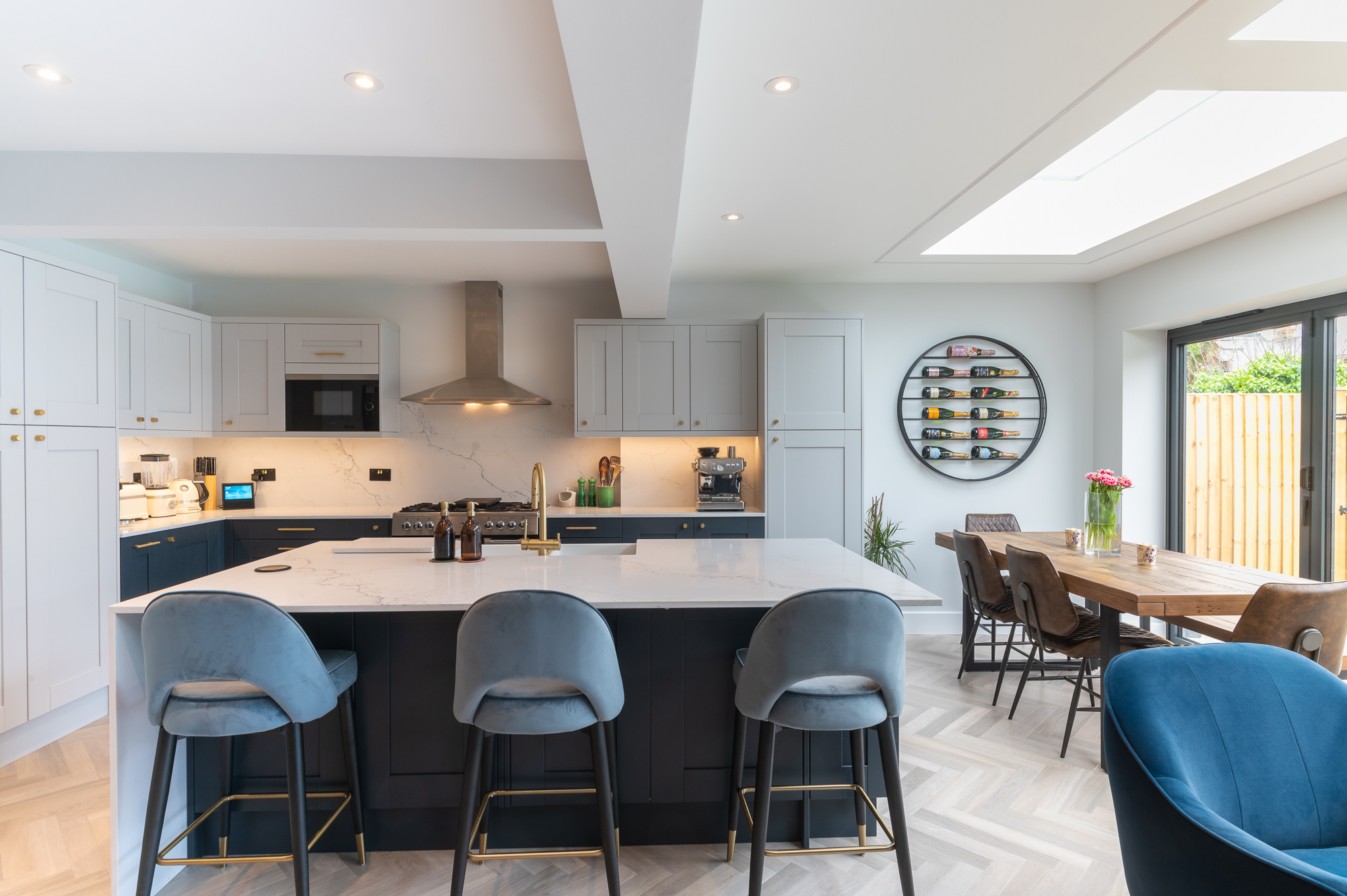Easy! Just tick off the following, and you are good to go.
A sophisticated look that solves a modern problem
For Londoners, space is precious. Often, the way to achieve more space is to buy bigger homes, which can be astronomical in price in the city. It is when homeowners look to loft conversion solutions, a cost-friendly alternative. Although loft conversions may not sound as transformative as moving into a new home, you will be pleasantly surprised by what they may end up looking, if executed properly. Some with en suite bathrooms can even compete with the size of a small London apartment. So, we are explaining everything you need to know about hip to gable loft conversions.
If your home is detached or semi-detached with a hipped roof, this one can go on your list of home conversion options. A hipped roof has slopes on either three or four sides. This type of conversion replaces one or more of the hips (sloping side) with a gable wall. The roof extends over the gable wall for more headroom.
- It is especially suitable for 1930s homes. This loft conversion method is possible on semi-detached, end of terrace, or detached property. A sloping side roof is a requirement. A detached house can have a double hip to gable conversion as there are two sloping sides to the roof.
- You should have a head height of 2.2m between the highest point of the roof and the existing ceiling floor.
- There should be enough space for fitting in a new staircase over the existing one.
However, an expert eye can distinguish between what is possible and not with adjustments within regulations. If you have ticked off the first item on the list, our free consultation service can clear the rest of your doubts on your property compatibility with this type of loft conversion.
Loft conversions fall under Permitted Development and usually do not require planning permission. Listed homes and ones in conservation areas do need to seek permission for building. Complying with building regulations will help the project move forward without obstruction. A Lawful Development Certificate (LDC) will give your proposed project full legal confirmation that planning permission isn’t required. You can apply for this from your local authority. However, planning permission is needed:
- The new addition exceeds 40m³ additional roof space on a terrace or end of terrace house, and 50 m³ on a semi-detached house or detached house.
- Your loft conversion features a balcony other than type Juliet.
- Materials used for the construction of the new living space are dissimilar to the rest of the house.
- Roof enlargement overhangs the outer wall of the original wall.
This style of loft conversion remodels one side of a hipped roof into a gable wall. It involves removing the sloping part of the roof and constructing a vertical wall reaching the same height as the central ridge. The central ridge gets connected to this new vertical wall, and the new roof assembled with rafters and tiles.
A smartly converted loft of this type can seamlessly blend in with the general architecture of your home. The new addition can easily pass off as part of the original construction.
A straightened sloping ceiling means more headroom for the additional space.
The new gable end can feature a window to bring in more natural light and views.
Usually, it only takes from 4 to 6 weeks.
Good Design & Build has transformed homes across London with the hip to gable design. Accomplish remodelling feats you didn’t think were possible with the unused space in your loft.
How we deliver projects
Our process is simple and divided into two distinct phases with separate contracts: Design and Build. As a client you only commit to one phase at a time depending on what stage of the process you are in. Each phase consists of three stages as described below.
1. Design
This is the kick-off point for your project. We carry out a complete architectural measured survey of the property. This allows us to create accurate CAD design drawings. This is followed by a design meeting to start discussing your ideas in more detail.
2. Planning
At this stage we finalise the designs with you and start preparing planning applications as needed. We place a high priority on ensuring that plans, designs and schedules are all based on a thorough and detailed understanding of planning guidelines. We co-ordinate with local authorities until the decision is made, and the planning approval is secured.
3. Technical
Once the planning consent is secured, we translate the design drawings into more detailed technical drawings for the purposes of building control and construction. This also includes specifications and structural calculations. At this stage, we will also submit to you our ‘no obligation’ quote for the build phase.
4. Pre-build
90% of our clients decide to stick with us after the design phase is completed. Once the build contract is signed, we kick off the process by making sure all the pre-build processes are complete. These include assistance with party wall agreements, Thames Water build over agreement, submitting building control application, and preparing method statements etc as needed. This stage ends with a pre-start meeting with your foreman before the actual build begins.
5. Build
One of our foremen will be dedicated to your project and will be on-site to manage everyday works. Our project managers will be overseeing the works to make sure they are completed to high standards, within your budget and on time. Throughout the process we will keep you updated with the progress and coordinate the works with third parties such as kitchen or flooring suppliers. We will also advise and guide you to choose any suppliers if needed.
6. Handover
As the build draws to finish, we will help to iron out any ‘snags’ to make sure everything is completed to your satisfaction. We will put together all necessary certificates such as gas, electricity and building control completion along with warranties for glazing, boiler etc. At the final completion meeting, we will hand you these documents, together with the keys to your house. Needless to say, you can contact us any time after this, if you want us to look at something.
This is the kick-off point for your project. We carry out a complete architectural measured survey of the property. This allows us to create accurate CAD design drawings. This is followed by a design meeting to start discussing your ideas in more detail.
At this stage we finalise the designs with you and start preparing planning applications as needed. We place a high priority on ensuring that plans, designs and schedules are all based on a thorough and detailed understanding of planning guidelines. We co-ordinate with local authorities until the decision is made, and the planning approval is secured.
Once the planning consent is secured, we translate the design drawings into more detailed technical drawings for the purposes of building control and construction. This also includes specifications and structural calculations. At this stage, we will also submit to you our ‘no obligation’ quote for the build phase.
90% of our clients decide to stick with us after the design phase is completed. Once the build contract is signed, we kick off the process by making sure all the pre-build processes are complete. These include assistance with party wall agreements, Thames Water build over agreement, submitting building control application, and preparing method statements etc as needed. This stage ends with a pre-start meeting with your foreman before the actual build begins.
One of our foremen will be dedicated to your project and will be on-site to manage everyday works. Our project managers will be overseeing the works to make sure they are completed to high standards, within your budget and on time. Throughout the process we will keep you updated with the progress and coordinate the works with third parties such as kitchen or flooring suppliers. We will also advise and guide you to choose any suppliers if needed.
As the build draws to finish, we will help to iron out any ‘snags’ to make sure everything is completed to your satisfaction. We will put together all necessary certificates such as gas, electricity and building control completion along with warranties for glazing, boiler etc. At the final completion meeting, we will hand you these documents, together with the keys to your house. Needless to say, you can contact us any time after this, if you want us to look at something.
What Our Clients Say
Featured Projects

Harlesden
Sellons Ave NW10 4HJ
The project included creating a master bedroom in the loft with an adjoining terrace.
Learn more

Fulham
Orbain Road SW6 7JZ
This project was completed in 2023 and the approximate budget was £101,000.
Learn more

Lambeth
Hetherington Road SW4
We completed this stunning project for our client Angus in Lambeth.
Learn more

Teddington
Station Road SW4 7PA
We completed this exciting project for our clients on Station Road, a quaint residential area in the heart of Teddington.
Learn more

Leyton
Windsor Road E10
We completed this kitchen extension on Windsor Road, a charming residential street nestled in the heart of Leyton.
Learn more

Harlesden
Sellons Ave NW10 4HJ
The project included creating a master bedroom in the loft with an adjoining terrace.
Learn more

Fulham
Orbain Road SW6 7JZ
This project was completed in 2023 and the approximate budget was £101,000.
Learn more

Lambeth
Hetherington Road SW4
We completed this stunning project for our client Angus in Lambeth.
Learn more

Teddington
Station Road SW4 7PA
We completed this exciting project for our clients on Station Road, a quaint residential area in the heart of Teddington.
Learn more

Leyton
Windsor Road E10
We completed this kitchen extension on Windsor Road, a charming residential street nestled in the heart of Leyton.
Learn more
Build a Quote!
Let's get started with building your own bespoke quote for your dream extension. Tell us as much in detail as possible to get most accurate price.
Get StartedBuild a Quote!
Let's get started with building your own bespoke quote for your dream extension. Tell us as much in detail as possible to get most accurate price.
Get Started







